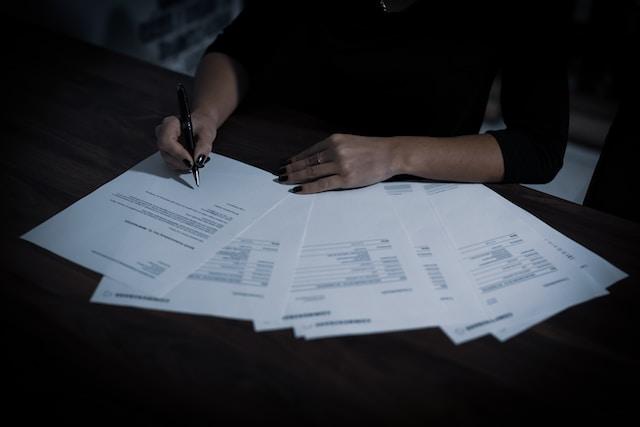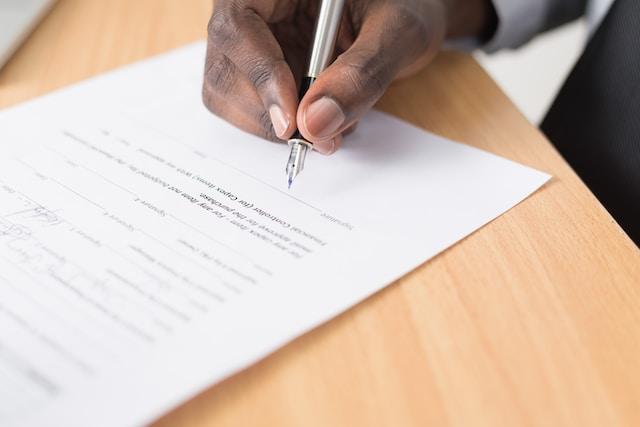What is a UCC Lien?
Our product recommendations are made independently, but we may earn affiliate commissions if you use a link on this page.
Most people who decide to open a small business do so with the intent of applying for a small business loan to secure financing. Depending on the financial institution you work with, it is most likely that they will ask for collateral.
When working in the business world, most states require that companies that deal with any type of transaction use Uniform Commercial Codes. Keep in mind, these codes were created to protect all individuals on both sides of the transactions.
If you plan on applying for a small business loan to open your company, you may want to learn a little bit more about a UCC lien. Keep reading to learn more.

What is a UCC Lien?
You may already know that the uniform Commercial Codes were enacted to protect the interests of all parties during transactions. The uniform nature of these codes is so that any state within the country could adopt them as is or make certain modifications.
Since these codes apply to the various activities that may occur whether a contract is in place or not, the legal rights of all parties involved can remain intact. Because of this, business transactions between various parties are considered to be fair and equitable.
When a new or existing business applies for a small business loan A lender often requires that the borrower provide collateral. They do this to ensure that if the borrower is not able to pay back the loan, they will not lose out altogether.
Since these lenders require collateral before a small business loan is approved, they often reveal this information in a UCC financial statement. This is done through a UCC one filing which in essence announces that they have the asset as collateral.
Once they have completed a UCC-1 filing to announce this collateral that they have taken on, they can then move forward with placing a UCC lien on the asset. The reason for the lean is to ensure that if the borrower cannot pay back the loan, the collateral becomes theirs.
What are the Different Types of UCC Liens?
It is important to understand, as a business owner, that there are different types of UCC liens that A lender can file. The one chosen by the lender may be different depending on what their specific requirements are.
If you want to know more about the different types of UCC liens that exist, read on.
Specific collateral UCC liens
This type of UCC lien requires that the borrower put up a specific piece of equipment or another asset that can specifically be used if the loan is defaulted on. In this type of situation, the lender files the UCC-1 to announce that they have acquired this specific collateral to secure the loan.
It is important to keep in mind that if the borrower does not have the funds to pay back the lender when it is due, the lender then gets to keep the collateral.
Blanket collateral UCC liens
In this type of UCC lien, a lender chooses to require blanket collateral which means that they have access to all assets that are owned by the business. This means that if the borrower defaults on the loan, the lender has the right to take control of all assets within the business.
For many lenders, this is the standard practice when they Supply small business loans to new or existing companies. In some cases, however, a lender does have a right to exclude some assets from the blanket collateral if the other assets are sufficient to pay back the amount loaned.

When are UCC Liens Filed?
Many small businesses wonder when a UCC lien is filed after they apply for a small business loan. In most cases, the UCC lien is filed immediately when the small business owner has applied for the loan and is approved.
As a small business owner, you should be aware that it is typically not a good practice to borrow from multiple lenders using the same assets. This is because should you default on your business loan, you run the risk of losing your entire business.
Additionally, many lenders include a stipulation against you using the same collateral across various other lenders. Because of this, you may not be able to use the same collateral should you apply for multiple loans.
One thing to keep in mind is that if you do take out multiple loans and use the same collateral (if it's allowed) the first lender that provided you with a loan has the right to the property first. Once the collateral provided has sufficiently paid back the first lender then anything left will go to the second lender in the case of default.
Does a UCC Lien Affect the Business?
It should be noted that anytime you as a business owner take out a small business loan, it can affect the business in various ways. While sometimes a loan is necessary to get a business started or keep one running, it should only be done when necessary.
There are multiple ways that a UCC lien can affect your business. keep reading to find out how.
Shows Up on the Business Credit Report
One thing to keep in mind when you apply for a small business loan that will require you to put up collateral is that a UCC lien often stays on your credit report for 5 years. This means that any action you take within those years can be seen by other creditors.
While having a UCC lien on your credit report should not affect your credit rating, it can be seen by others if you apply for other types of credit. Should you default on the loan, your credit rating will take a hit.
Prevents the Business From Taking Out Other Loans
Taking out a small business loan and having a UCC lien on your credit, can prevent the business from taking out other loans. This is especially true if you are just starting because lenders often know that you may not have very many assets.
If the UCC lien that you have is a blanket lien then they may require that you pay off the first small business loan before you can apply for another. Since a blanket collateral lien allows the first lender to take control of any assets that the business has, there may not be anything left if they lend you money.
Can Lead to Greater Risk if Not Paid Back
In addition to the risk that a UCC lien has on your credit rating and prevention of taking out other loans, there are other greater risks if the loan is not paid back. Most people go into business for themselves because they have a passion for something and a desire to work for themselves.
If you have to take out a small business loan and A lender puts a UCC lien on your business, you run the risk of losing everything that you're passionate about. This is because if you are not able to eventually pay back the loan, you will lose your business.

What Types of Assets Can Be Used for a UCC Lien?
When a small business owner chooses to take out a loan where A lender requires collateral, you should understand what types of assets this can include. Since in most cases, the amount of money a business owner is borrowing is typically substantial the lender most likely requires movable collateral.
Here are the various types of collateral that most lenders require for small business loans:
- Vehicles
- Equipment or machinery
- Inventory
- Investment securities
- Letters of credit
- Office fixtures and furniture
While this is not an exhaustive list of the types of collateral that lenders will take when they approve small business loans, you can see that it covers many types of assets that a small business may have.
How Can You Have a UCC Lien Removed?
When you take out a small business loan and the lender files a UCC lien on your company, you may be wondering how you can go about getting this removed. It is important to understand that there are only a few ways that a UCC lien can be removed from your credit report.
Pay the loan in full
Once you have met all the requirements of the lender, meaning you have paid back all of the money and fees in its interest that apply, the lien can be removed from your account. In most cases, the lender will report to the Secretary of State that you have paid off your loan and that the lien can be removed.
Apply for a UCC-3 Financial statement Amendment or termination
If you know that you have paid off your loan to the lender then you may have to request them to file a UCC-3 financial statement Amendment to terminate the lien. This is especially important for you to do yourself once you have paid off your loan since most lenders just allow the UCC lien to fall off your statement after 5 years.
Reference Legal Explanations
If you use any of the definitions, information, or data presented on Legal Explanations, please copy the link or reference below to properly credit us as the reference source. Thank you!
-
<a href="https://legal-explanations.com/blog/what-is-a-ucc-lien/">What is a UCC Lien?</a>
-
"What is a UCC Lien?". Legal Explanations. Accessed on December 12, 2024. https://legal-explanations.com/blog/what-is-a-ucc-lien/.
-
"What is a UCC Lien?". Legal Explanations, https://legal-explanations.com/blog/what-is-a-ucc-lien/. Accessed 12 December, 2024
-
What is a UCC Lien?. Legal Explanations. Retrieved from https://legal-explanations.com/blog/what-is-a-ucc-lien/.